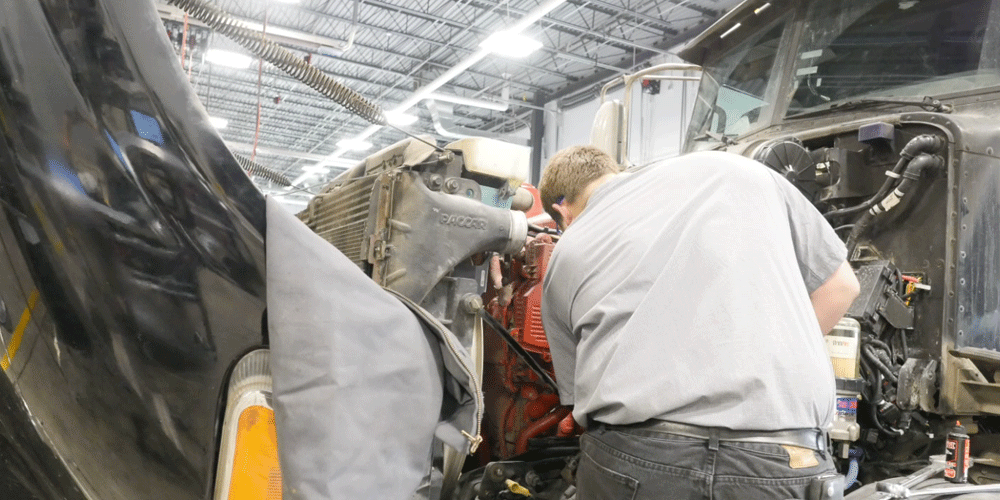Independent Contractor | Company Driver
Company Driver vs. Independent Trucking Contractor
Robbie came to ATS with ten years of transportation experience under his belt. He has worked at ATS for the last seven years as a driver consultant. He prides himself on using his industry knowledge to assist drivers in making the best decisions for themselves.
It’s the age-old question for truck drivers: Should I be a company driver or an independent contractor?
While a company driver works for a specific trucking carrier as an employee — and drives equipment provided to them — an independent contractor works with the carrier and leases or owns their own truck.
Making the decision between working with a trucking carrier as a company driver versus leasing with them as an independent contractor is not a decision you should take lightly. It will have a significant impact on your trucking journey, so thoroughly considering your options is necessary.
In fact, deciding between being a company driver and an independent contractor may be one of the hardest decisions drivers have to make. As a driver recruiter at Anderson Trucking Service (ATS), I help drivers like you make this important decision every day.
If you’re trying to decide what the next step in your trucking journey is, this article is for you. By the end of this article, you will understand the differences between company drivers and independent contractors when it comes to pay, maintenance responsibilities, home time, freight options and benefits.
Which Pays Better?
On paper, it looks like independent contractors make significantly more money than company drivers. But it’s important to consider the added expenses and responsibilities that come with being an independent contractor.
Here are some of the key differences between company driver pay and independent contractor pay.
Company Drivers
As a company driver, you can count on stability and consistency. Company drivers are typically paid cents per mile (CPM), which offers more consistent pay when compared to percentage pay.
When the cost of freight rises and falls, a company driver won’t be affected because they’re not being paid by the percentage of the load.
Independent Contractors
An independent contractor is typically paid by the percentage of the load. That means when freight prices are high, you’ll see great settlements, but when the freight prices are low, your paychecks will take a hit.
Unlike a company driver, an independent contractor will have to worry about making their lease payment every week unless they already own their truck. That payment, along with paying for insurance, taxes and maintenance costs, will cut into their salary.
When all is said and done at the end of the year, an independent contractor will more often than not take home more money than a company driver. With all of the extra expenses that independent contractors are responsible for compared to company drivers, the discrepancy isn’t significant, but it’s still something to consider.

Comparing Maintenance Responsibilities
Ongoing maintenance is a big responsibility of being a truck driver. Depending on which role you choose, keeping up with truck maintenance and the cost associated with it falls on the company you work for or you.
Company Drivers
The cost of maintenance is covered by the carrier for a company driver.
If you break down, your carrier will cover the costs associated with fixing your truck and your accommodations while you are waiting to get back up and running.
You’ll be provided a specific rate for breakdown pay that you can use to cover accommodations, rental cars or meals.
Independent Contractors
As an independent contractor who owns their own business, you have a lot more responsibility than a company driver does. On top of your lease payment, you’ll have to cover maintenance costs. If you break down, coming up with the money to cover accommodations, rental cars and meals is your responsibility.
With a little financial planning in place and money in your reserve accounts, this might not be a setback for you. However, it’s still something you need to think about.
How Often Can I Go Home?
Home time is an important consideration for drivers — especially for drivers who have a family. If you value being routed through the house often, being a company driver offers you consistent home time. As an independent contractor, home time isn’t always as consistent.
Company Drivers
As a company driver, home time is consistent. Your driver manager will work with you to try to ensure that you are getting home at least every two weeks.
If getting home on a regular basis is important to you, being a company driver might make the most sense for you.
Independent Contractors
Independent contractors will need to be flexible with their home time. As freight values rise and fall, you may want to stay out longer to take advantage of high freight prices. You may want to take advantage of home time when freight costs are low. The longer you are out on the road, the more opportunity you have for revenue.
An important consideration about being a contractor is you don’t receive paid time off (PTO) benefits like company drivers do. So when you go home for an extended period of time, you’re not getting paid.
However, your truck payments don’t take vacations — meaning you’ll still be responsible for your everyday expenses. Responsible independent contractors plan for this by budgeting accordingly.

Comparing Freight Options
Both the type and cost of the freight you haul play a major role in how much money you’re taking home every week.
Learn more about the key difference between company drivers and independent contractors when it comes to freight options.
Company Drivers
At virtually every trucking company, company drivers are assigned freight — meaning they are sent a load by their dispatcher and they have to haul it.
While the best carriers will always aim to make you successful — and allow drivers to refuse loads if there are extenuating circumstances — customers rely on the carrier and you to deliver their freight.
Independent Contractors
As an independent contractor, you have freight options. You’ll be given loads and get to decide which ones you want to take. You’ll be able to consider which loads are the best for you, your business and your family. This provides a lot more flexibility in how you run when compared to company drivers.
This also puts the responsibility on you to understand the freight landscape so you can make good choices.
Comparing Benefits
Great benefits may be the difference between choosing a carrier to call your home or finding something else. Especially for drivers with families to take care of at home, great benefits can be the deciding factor for whether you choose one job versus another.
Benefits vary greatly between company drivers and independent contractors.
Company Drivers
As a company driver, you are considered an employee of the company, which means you will reap the rewards.
Depending on what the company offers, you will receive company-sponsored benefits including health, dental, vision, disability and life insurance. You may see an employer match if they offer retirement plans. You’ll also likely receive vacation pay.
Receiving insurance benefits is particularly important to drivers with families.
Independent Contractors
Independent contractors are responsible for taking out and paying for the various forms of insurance that are required as a driver. The trucking company typically covers primary and cargo liability insurance, but paying for physical damage coverage and non-trucking liability coverage is your responsibility. Rates vary depending upon your experience, the cargo you carry and your driving record.
Independent contractors won’t receive company-sponsored benefits, but organizations like Universal Truckers Benefits Association offer benefits options for drivers.
Should I be a Company Driver or an Independent Contractor?
Ultimately, the decision of whether you should be a company driver or an independent contractor comes down to personal preference regarding which job aligns with your lifestyle and goals.
As a company driver, you can count on stability and consistency. You’ll see a consistent paycheck, have consistent home time and receive insurance benefits for you and your family.
As an independent contractor, you have the opportunity for high reward but it comes with a high risk. You can earn more money and you have more flexibility than a company driver.
What is My Next Step?
Still wondering what the next step in your driving journey is? You can learn more about company drivers, independent contractors, and owner/operators, how they’re paid and what benefits they receive at ATS.
Now that you are ready to get some more information, fill out our request for information now.
You will be contacted by a knowledgeable, experienced ATS driver recruiter. They will help you weigh the pros and cons of being a company driver versus an independent contractor so you can feel good about your final decision. As a Top Pay Carrier, we offer competitive wages and benefits for our drivers.

